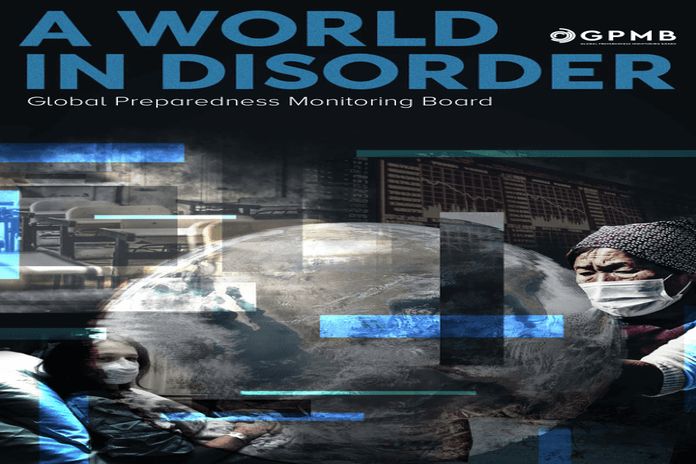GENEVA, Switzerland — COVID-19 has taken advantage of a world in disorder, causing catastrophic health, social, and economic consequences and irreparable harm to humanity. The virus has killed close to a million people and many more may die as a result of its impact on health systems, food supplies, and the economy. The financial cost will be in the trillions.
This will not be the last global health emergency. The world simply cannot afford to be unprepared again, warns the Global Preparedness Monitoring Board (GPMB) in its second report ‘A World in Disorder’, released Monday.
Last year, the GPMB warned that the world was unprepared for the very real likelihood of a deadly pandemic spreading around the globe, killing millions of people, disrupting economies, and destabilizing national security. The Board called for urgent action to break the cycle of panic and neglect that has characterized the response to global health crises in the past.
In its new report, the GPMB provides a harsh assessment of the global COVID-19 response, calling it “a collective failure to take pandemic prevention, preparedness, and response seriously and prioritize it accordingly.” In many countries, leaders have struggled to take early decisive action based on science, evidence and best practice. This lack of accountability by leaders has led to a profound and deepening deficit in trust that is hampering response efforts.
“Transparency and accountability are essential in responding to the COVID-19 pandemic,” said Elhadj As Sy, co-chair of the GPMB. “Trust is the foundation of government-community relationships for better health but that trust dissipates when governments and leaders do not deliver on their commitments.”
Responsible leadership and good citizenship have been key determinants of COVID-19’s impact, the report finds–systems are only as effective as the people who use them.
The report also finds that, while COVID-19 has demonstrated that the world is deeply interconnected through economics, trade, information, and travel, one of the greatest challenges of the pandemic has been faltering multilateral cooperation. Leadership by the G7, G20, and multilateral organizations has been hampered by geopolitical tensions. The Board calls on leaders to renew their commitment to the multilateral system and strengthen WHO as an impartial and independent international organization. Weakening and undermining the multilateral action will have serious consequences on global health security, it warns. No-one is safe until all are safe.
“Viruses don’t respect borders. The only way out of this devastating pandemic is along the path of collective action, which demands a strong and effective multilateral system,” said H.E. Dr Gro Harlem Brundtland, co-chair of the GPMB. “The UN system, which includes the WHO, was created after World War II and has helped make the world a better place for billions of people. It needs to be defended, strengthened, and revitalized, not attacked and undermined.”
The report highlights how the devastating social and economic impact of pandemics, especially for the vulnerable and disadvantaged, is often underestimated and ignored. COVID-19’s long-term socioeconomic impacts are predicted to last for decades, with the World Bank’s conservative scenario estimating a US$ 10 trillion earning loss overtime for the younger generation as a result of pandemic-related educational deficits.
COVID-19 has demonstrated the importance of protecting lives and livelihoods and widening our understanding of preparedness to make education, social, and economic sectors ‘pandemic proof.’ ‘A World in Disorder’ reveals that the return on investment for pandemic preparedness is immense. It would take 500 years to spend as much on preparedness as the world is currently losing due to COVID-19.
“The pandemic has shown the fragility of not only our health systems, but also our global economy. The impact of COVID-19 has been huge in the world and particularly in my region, the Americas, with a sharp increase in health, social and economic inequities”, said Jeannette Vega, GPMB member and chief medical innovation and technology officer, La Red de Salud UC-Christus, Chile. “Let’s hope that this time we finally learn the lesson and invest in preparedness and public goods for health to avoid similar tragedies in the future.”
The report highlights the actions that must be taken to end the COVID-19 pandemic and avoid the next catastrophe – to bring order out of chaos. It calls for responsible leadership, engaged citizenship, strong and agile systems for health security, sustained investment, and robust global governance for preparedness.
‘A World in Disorder’ identifies the specific commitments and actions leaders and citizens must take — boldly, decisively, and immediately. These include sustainable and predictable financing for global and national health security, and a call to hold a UN Summit on Global Health Security to develop an international framework for health emergency preparedness and response.
“We can no longer wring our hands and say something must be done. It’s time for countries to get their hands dirty and build the public health systems to ensure a pandemic of this magnitude and severity never happens again“, said Dr Tedros Adhanom Ghebreyesus, WHO director-general. “This will not be the last pandemic, nor the last global health emergency. But with the right political and financial investments now, we can prevent and mitigate future pandemics and protect our future and the future of generations to come.”





